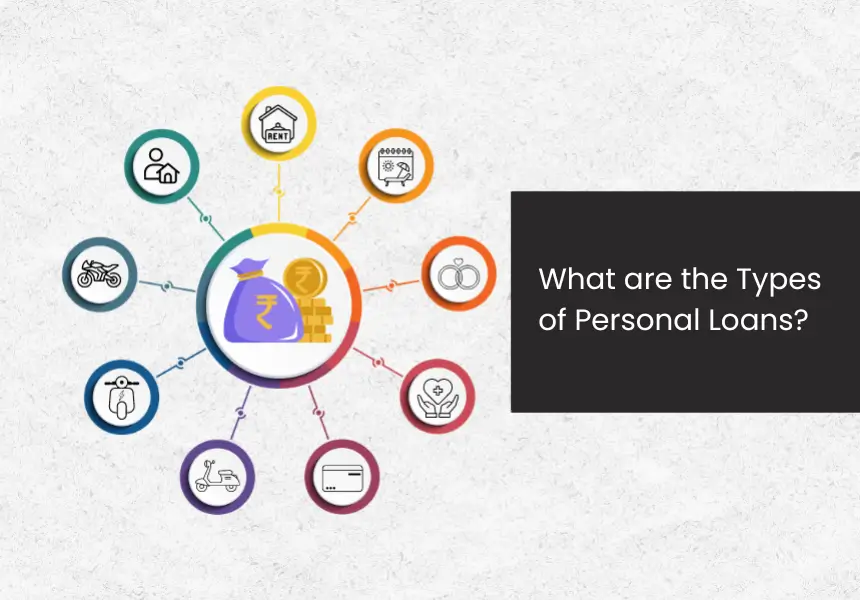
With the emergence of an aspiring new age millennial segment, the concept of earning and spending has transformed over the years. The Gen Y has given a new outlook to the way they desire to lead their lives. Spending on lifestyle and experiences have become a priority as compared to saving for the future, or as they say – “Living in the present” is more important now. To accomplish big dreams and aspirations, one needs resources too. To fulfill these needs and requirements, New age lenders have evolved as well. With the help of technology, lenders have innovated and introduced various credit products in order to meet the life stage requirements of millennials. Personal loans have become more accessible and need specific over the years.
We come across multiple scenarios in life where we would rely on different forms of credit in order to fulfil our dreams or our wish lists. The millennial population constitutes the majority of borrowers today. While you are on the outlook for a personal loan, various factors come into play, such as availability, affordability and eligibility. You may want to multiply your chances of having your loan approved. In order to help you eliminate or at least minimise the chances of your personal loan application being rejected, here is an in-depth journey through some of the parameters that most of the lenders consider while processing your loan application.
Servicing loan policies may differ from lender to lender, however, largely they are all formulated based on the below categories. If you have a clear chit on these parameters, your profile may come under the category of Creditworthy Applicants.
1. Know your Customer (KYC)
This stage is not only the primary stage of assessment but also, the most crucial of them all. In this phase the lender tries to gauge maximum information about the application holder. They would demand your basic documents like PAN card, Aadhar card, Bank statements, salary slips and address proofs. These documents help determine the authenticity of an applicant. It is the primary examination in order to know the best suitable customer. It is essential to provide genuine documents to your service provider. In case you change your place of residence frequently, you must ensure you have all the documents in place including your permanent resident proof as well as current address proof. This is to ensure that the lender must be able to reach you to process your application.
In order to process your loan application at the earliest, you must ensure availability of adequate documents and must submit them on time. Most of the lenders may demand the below documents for the KYC process –
- PAN-Card
- Aadhar card
- 6 months Bank statement
- 3 months Salary slip
- If you have changed your job in the near term, say 3-6 months’ span, you must provide the salary slips of the previous employment as well as the current one, when asked for by the Credit Manager
- Address Proof
The requirement of KYC documents may differ from Lender to lender. Thus, you must keep all the essential documents handy and submit them when demanded.
2. Income
This is one other criterion that is pre-set by the lender. Most lenders specify the minimum required income under the head – Loan Eligibility, on their website. Apart from the basic income requirement, lenders do examine various parameters associated with your income
- Nature of employment – Here, the lender will try to gauge the type of pay structure you are on. Whether you have a fixed income or are on a stipend pay roll, wages or on commissions. It is necessary for the lender to know how stable your monthly income is. A fixed income often shows stability of funds. Thus, it will help determine your capacity to service your loan smoothly, along with managing other basic expenses.
- Debt to Income ratio – Debt to Income Ratio (DTI) defines the ability of an applicant to manage his liabilities and monthly expenditure within his monthly earnings. Lenders use this method to evaluate your credit worthiness. DTI has a direct impact on the first impression of your creditworthiness. A higher DTI will indicate that the majority of your income is disposed of towards the payments of your debts. 30% to 50% DTI is considered to be a healthy ratio highlighting your ability to manage your debts prudently while leaving you some amount of savings after the basic expenses have been taken care of.
- Fixed Obligation to Income Ratio (FOIR) – FOIR is yet another method to gauge the applicants’ eligibility for borrowing. Before a lender approves your personal loan, it would scrutinize your financial history and your ability to be able to repay the borrowed sum. FOIR is a concept just like DTI. Both the tools are used to determine how much debt would an applicant be able to bear. The lenders take into consideration your income and expenses each month. These include your fixed liabilities (on-going debts) as well as other variables like credit card payments and rent components. The FOIR requirement is different for every lender, however, 40-50% FOIR is more likely to increase your chances of loan approval.
Improve FOIR – Adopt the 50-30-20 Rule
Managing your finances and bringing them in order is not such a difficult task to do. You must adopt a 50-30-20 Rule to be master of your finances and budget out your income and expenses.
50% of your monthly income must be utilized towards basic needs such as rents, daily bread and butter, utilities, transportation, Debts payments etc. You must clearly define what must come under the category of ‘needs’ and how important it is to cater to them on a timely basis.
30% of your monthly income must be set aside in order to cater to your desires. Desires may differ from person to person. They may largely include dine outs, movies, holiday with family or friends, upgrading gadgets and other experiences.
The remaining 20% of your monthly income must be strictly set aside as savings. You cannot predict with absolute surety about the occurrence of an emergency which may require the funds on an immediate basis. If the Savings remain untouched, you may be able to utilize them for future investments or funds for retirement.
Adopting the 50-30-20 Rule serves as a saviour in tough times and also inculcates a habit of saving. Nothing delivers better than a financial plan that is prudently executed to combat shortcomings in the near future.
Related articles –
What is Debt to Income Ratio (DTI)? How Does it Factor in your Loan Eligibility?
Decoding Loan Jargon – Personal Loan Glossary
3. Banking
At this stage, the lender would cross check your banking records. It is usually taking into account your salaried account as well as your savings. A lender will closely examine your bank statement and note the income and expenditure patterns based on your bank records. Lenders would determine the following parameters based on your records –
Credit Utilization Ratio (CUR) – Credit Utilization Ratio is the ratio between the credit used as compared to the credit made available to you. For example, you have a credit limit of INR 1,00,000 on your credit card and you spend INR 60,000; this indicates your credit utilization ratio is 60%. A balanced credit utilization ratio is essential for a good credit score. CUR of 30% is considered to be a desirable ratio. The lower your CUR, the better are your chances of loan approval. If you have a higher CUR the lender is liable to consider that you are not capable of handling your credit responsibly.
Authenticity of Bank records (Forgery) – While providing your bank documents, it is of utmost importance to provide the latest and authenticated documents to your lender. Even a minor hiccup that arises in the bank document verification, will defer your chances of availing a loan. Thus, you must refrain from any act of forgery or fraudulent documents. You don’t want to get into the bad books of lenders, for sure!
4. Credit Score
As we are well aware, the credit score plays a major role in determining not only the approval of lenders for providing debt but also, the loan tenure, loan amount and the interest rate applicable are based on the same. It is a statistically derived 3-digit number that is determined based on your credit history. It holds a vital weightage in the decisioning process. All your credit records must be up to date in order to accurately represent your credit score. A good credit score indicates Financial discipline. A healthy credit score would be 750 and above, showcasing your ability to service your debts with utmost responsibility and ensure closure of your loan account in the chosen tenure.
Keep a close check on your credit score, as you may have the option of negotiating the interest rate for a comparatively lower one provided you have a good credit score. However, a lower credit score will only diminish your chances of having your loan approved, and indicates that you need to manage your debt wisely.
New to credit Customers – Individuals who have never accessed any form of debt may sooner or later find the need to avail one. New to credit customers are likely to have a lower credit score or no credit score at all. Thus, the appraisal process that lenders would follow would differ from the regular process. For such cases, customers need to keep a few points into consideration in order to improve the chances of approval of the desired loan amount.
As new to credit customers lack a credit history, a lender would take other factors into account. If the customer is using credit cards the lender would verify how responsibly he/she is servicing the credit. They will also consider the credit utilization ratio. Also, the nature of employment and employment records would play a major role. You must ensure you have job stability to improve your chances of approval. Alongside, try to maintain residential stability.
Tips on Improving your Credit Score –
There are some common habits that you can inculcate in order to improve your credit score.
- Do not apply for multiple credit products at once if you cannot afford them.
- Make sure that you service your loan responsibly and ensure timely repayments towards them.
- Ensure that your Credit Utilization ratio does not exceed 30%.
- When in need of credit, you mustn’t apply for a personal loan on multiple platforms. In this case, the lenders will end up making hard enquiries on your credit score. It will eventually take a hit on your credit score.
- Close your loan accounts in time. If you have multiple on-going loans, you may choose to take a personal loan for Debt Consolidation in order to manage your debt effectively. One loan account is easier to service as compared to several loan accounts.
- You must ensure that you do not default on the payments due on any of the loan accounts as well as on credit card payment.
- Keep checking on your credit score and credit reports on periodic intervals, in order to spot the errors on any transaction/penalties that have been wrongly implied, and rectify the.
Related Articles –
Better Credit Score With These Simple Routines in 2020
Good Credit habits are here: How to build High CIBIL Score
5. Contactability
It is essential that a lender has adequate contact information. This information includes your address, contact number, employer details, Email address etc. You must provide the information best to your knowledge. A lender needs to communicate at multiple instances with his borrowers. Starting right from delivering the loan agreement to collecting essential documents, EMI payment notification etc.
Professionals are often spending maximum time of their day at work, thus, making them unavailable at the residence. In such scenarios, an Office address comes handy. Similarly, if an individual is residing in a rented accommodation, it is necessary he provides the current address along with the permanent address to ensure his availability while the lender would want to reach out to him. So, you must provide the right details and ensure your documents are accurate and complete before applying for a loan.
Risk Analysis
One very crucial part of the entire application process is the Risk Analysis. Every Credit Manager is responsible for assessing the associated risks along with every application or individual availing a personal loan. This also includes the necessary verification viz., credit records, resident verification, banks records etc. This assessment involves a thorough examination of the above-mentioned parameters. Even the smallest of the doubt could put your application under a microscopic lens.
How to Fast-track your loan process and successfully pass the Risk Analysis?
Based on the above information regarding the factors considered while availing the loan, we have formulated a few tips to keep in mind in order to smoothen the verification process.
- Provide authentic documents. Provide the right information while you fill up the application form.
- Ensure that the details on the form match the details mentioned on the documents.
- Declare any additional income if you have, other than the regular source of income.
- Provide alternative contact details in case you are unavailable. These details could be your office number or contact details of your spouse or parents.
- Ensure that you hold a stable job to increase the reliability of repayment of the personal loan, in view of the lender.
- You must also provide the right information of your residence, including Permanent and current address details.
- Ensure that you make yourself available while the representative visits you for a physical verification.
- If you are unavailable at the time of the representative visit, ensure that you inform the lender regarding change of time or you may request them to arrange a visit at the office address.
- You must essentially ensure that you provide the correct bank statements as they formulate the basis of your financial records.
Understanding the stages of the application process will help you prepare for the journey. It will ensure speedy processing and you can avail personal loan of your choice, suited for your cash requirements as early as possible!
At LoanTap, we provide an easy online application with minimal documentation. Our loans are customized and designed with flexible repayment options, keeping in mind the cash flow cycles of millennials. The personal loan process is transparent and no hidden charges are applicable. We ensure you can meet your cash requirements in a hassle-free manner!
Related Articles –
Why your Personal Loan Application can be Rejected?
Applying for your First Personal Loan? Here’s What You Should Know








